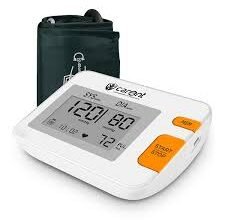Is Your Fitness Tracker Really Accurate? Here’s the Truth
Fitness tracker accuracy revealed. Discover how reliable your wearable really is for steps, heart rate, calories & sleep tracking. Learn the truth now.

Fitness trackers have revolutionized the way we monitor our health, offering real-time insights into everything from daily steps to sleep quality. Millions rely on these wearable devices to track progress, set goals, and stay motivated but how much can you really trust the data they provide? While brands like Fitbit, Apple, and Garmin promise precision, studies reveal surprising inconsistencies in fitness tracker accuracy, raising important questions about their reliability.
Despite their popularity, fitness trackers are not medical devices, and their measurements often rely on algorithms rather than clinical-grade sensors. Whether you’re counting steps, monitoring heart rate, or analyzing sleep patterns, understanding the limitations of these wearables is crucial. This explores the science behind fitness tracker accuracy, revealing what they get right and where they often fall short so you can make informed decisions about your health and fitness journey.
Is Your Fitness Tracker Really Accurate? Here’s the Truth
How Do Fitness Trackers Measure Activity?
Most fitness trackers rely on accelerometers and gyroscopes to detect movement. These sensors track motion patterns to estimate step counts and distance traveled. However, factors like arm movement, device placement, and walking style can affect accuracy. For example, swinging your arms while sitting might register as steps, while pushing a stroller may not be counted at all. Higher-end models incorporate GPS tracking for more precise distance measurements, especially for outdoor runs and cycling. However, even GPS-enabled devices can struggle in dense urban areas with tall buildings or under heavy tree cover.
Heart Rate Monitoring
Optical heart rate monitors in fitness trackers use photoplethysmography (PPG) to detect blood flow changes under the skin. While convenient, these sensors are less accurate than chest strap monitors, which use electrocardiography (ECG). Intense movements, skin tone, and even tattoos can interfere with readings. Research indicates that fitness trackers are generally reliable for resting heart rate but may struggle during high-intensity workouts. For casual users, this may not be a major concern, but athletes and individuals with heart conditions should consider medical-grade devices for precise monitoring.
Calorie Burn Estimates
One of the most debated features is calorie tracking. Fitness trackers estimate calories burned using algorithms that factor in heart rate, age, weight, and activity type. However, these calculations are based on averages and may not account for individual metabolic differences. Studies comparing fitness trackers to clinical measurements found significant variations some overestimating calorie burn by up to 40%. While they provide a rough estimate, they shouldn’t be the sole basis for dietary decisions. Pairing tracker data with other health metrics can offer a more balanced perspective.
Sleep Tracking
Many wearable devices now offer sleep tracking, claiming to measure sleep stages (light, deep, REM). These trackers use movement and Heart rate variability (HRV) to estimate sleep patterns. However, they cannot match the precision of a polysomnography (PSG) test conducted in sleep labs. Despite their limitations, sleep trackers can help identify trends, such as frequent awakenings or inconsistent sleep schedules. Users should focus on overall patterns rather than nightly variations for better insights into their sleep quality.
Factors Affecting Fitness Tracker Accuracy
Several key factors influence how precise your fitness tracker’s data really is, including device placement (too loose or wrong wrist position), activity type (some struggle with non-step movements like cycling or weightlifting), environmental conditions (GPS accuracy drops in urban areas or bad weather), individual physiology (skin tone, tattoos, or wrist size can affect optical sensors), and software algorithms (different brands use varying formulas for calculating steps, calories, and sleep).
Are Expensive Fitness Trackers More Accurate?
Premium models like the Apple Watch Series 9 or Garmin Fenix 7 often include advanced sensors and better algorithms, improving reliability. However, mid-range devices like the Fitbit Charge 6 or Xiaomi Mi Band 8 can still provide useful data for general fitness tracking. The key is to match the device’s capabilities with your fitness goals. Competitive athletes may benefit from high-end trackers, while casual users might find budget options sufficient.
How to Improve Your Fitness Tracker’s Accuracy
Wear Your Device Correctly
Proper placement dramatically improves your fitness tracker’s accuracy. Wear the device snugly about one finger-width above your wrist bone, ensuring consistent skin contact. Avoid loose fitting, as movement gaps can distort sensor readings during activities.
Software Updated Regularly
Manufacturers constantly refine tracking algorithms through updates. Enable automatic updates or manually check monthly to ensure your device uses the latest accuracy-enhancing technology. Outdated software may provide less reliable data.
Calibrate Your Device
Most trackers allow manual calibration for steps, distance, and GPS. Walk a measured distance while calibrating to improve future activity tracking precision. This helps account for your unique stride length and movement patterns.
Maintain Clean Sensors
Sweat, dirt, and sunscreen can interfere with optical sensors. Gently clean the sensor area daily with a microfiber cloth to ensure proper heart rate monitoring and skin contact. Avoid scratches that could distort light-based measurements.
Choose the Right Activity Mode
Manually select workout types (running, cycling, swimming) to activate specialized tracking algorithms. Using the wrong mode may compromise calorie burn accuracy since different activities engage muscles differently.
Pair With Complementary Devices
Sync your tracker with a chest-strap heart monitor or smartphone GPS occasionally to verify data. Comparing multiple sources helps identify and correct any tracking discrepancies in your primary device.
Consider Your Skin Tone
Dark skin tones and wrist tattoos may affect optical sensor performance. If noticing irregular readings, try adjusting tightness or wearing the device on your inner wrist where pigmentation is often lighter.
Replace Old Devices
Tracking technology advances rapidly – devices over 3 years old may lack modern accuracy enhancements. Consider upgrading if your current model consistently provides questionable data compared to newer alternatives.
Read More: Top 5 Smart Health Gadgets You Should Own in 2025
Conclusion
Fitness tracker accuracy remains a hotly debated topic, with studies showing that while these devices can be helpful tools, they shouldn’t be taken as absolute truth. Whether measuring steps, heart rate, calories burned, or sleep quality, most wearables provide estimates rather than medical-grade precision. Factors like device placement, movement type, and even skin tone can influence readings, meaning your tracker might occasionally overestimate or underestimate your actual activity. However, for general fitness monitoring and motivation, they still offer valuable insights when used with realistic expectations.
At the end of the day, fitness trackers are best viewed as supportive tools rather than definitive health monitors. While they can help identify trends and encourage healthier habits, they shouldn’t replace professional medical advice or more precise measurement methods. As technology continues to improve, we may see greater accuracy in future models but for now, understanding their limitations ensures you get the most out of your wearable without relying on it blindly. Pairing tracker data with other health metrics and listening to your body will always be the best approach to overall wellness.
How accurate are fitness trackers for counting steps?
Most devices are about 90% accurate for step counting but may miscount non-walking movements or miss steps when your arms are stationary.
Can I trust my fitness tracker’s heart rate readings?
While generally reliable for resting rates, optical sensors often struggle with high-intensity workouts compared to medical-grade EKG monitors.
Do fitness trackers accurately measure calories burned?
Calorie estimates can vary by 20-40% since they use generic algorithms that don’t account for individual metabolism differences.
Why does my sleep tracker show inconsistent results?
Wearables detect movement and heart rate changes but can’t precisely measure sleep stages like professional sleep studies can.
Are expensive fitness trackers more accurate than budget models?
Premium devices typically offer better sensors and algorithms, but even high-end trackers still have limitations compared to medical equipment.











